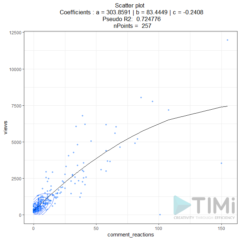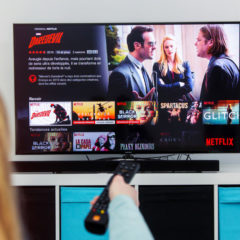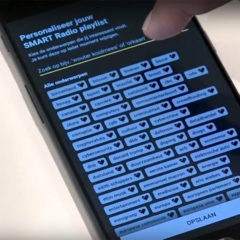6 algorithms that have triggered disaster
Algorithms are increasingly used to help humans in their decisions. A poorly programmed algorithm, or humans lacking critical thinking skills, are recurrent causes of algorithmic errors. These errors sometimes trigger users’ anger or incite them to hack them. This article analyzes 6 algorithmic errors that have had harmful consequences on humans. The 4th example is particularly serious because it impacted thousands of people and caused irreparable damage (suicides, separations, unjustified debts). Only for our subscribers: exclusive analyses and marketing advice Email address *...
Nudge: how to influence nutrition with algorithms?
Algorithms are widely used to personalize the online experience. They are largely based on algorithmic recommendation systems. While recommending movies or products is relatively simple, proposing food or recipes is more complex. Popularizing grocery delivery services and recipe websites has spurred developments in this area. In this article, we will discuss the use of these algorithms to simplify dietary choices the trade-off between food “popularity” and health the role that nudges can play in this area (and whether they...
We forgive mistakes made by algorithms more easily than by humans
Algorithms have taken over. They are in charge of making more and more decisions. More and more complex decisions affect all aspects of our lives. But algorithms are not perfect. They also make mistakes. So, a question arises: do we forgive algorithms more easily than human beings for the same mistake? Research from 2021 sheds new light on this question and provides essential insights into the ideal characteristics of algorithms and chatbots. Contact us for your data project If you only...
AI enriches the experience of visitors to the Alechinsky exhibition
In a context where the Covid crisis severely impacts culture, it is more important than ever to build visitor loyalty. I had proposed different ways to improve the customer experience in museums, and today I suggest discovering an initiative of the Royal Museums of Fine Arts in Brussels. An exhibition dedicated to the Belgian artist Pierre Alechinsky has just opened and gives a very nice overview of his plethoric production. On this occasion, an interactive device using artificial intelligence allows...
This YouTuber has 50 million subscribers, and that’s not good news
For the end of the year 2020, MrBeast, YouTuber with 50 million subscribers, has put online a video that is symptomatic of the evils of our society. This video was truly disgusting to me because, in addition to being useless, it promotes the values that destroy our living together. And yet it has already garnered 30 million views. MrBeast offers us the distressing spectacle of our addictions and the values that motivate us. Who is MrBeast?...
RecSys 2020 : 4 reasons why social media manipulate us
The RecSys 2020 conference took place last week in a new form because of the pandemic. I should have been in Rio de Janeiro with the rest of the scientific community to talk about recommendation systems like every year. Covid-19 changed our plans, and the conference was held online. Despite this move into the virtual sphere, the time difference and the lack of physical meetings, I was still able to take advantage of it. In this article, I...
What do you have to talk about on LinkedIn to get likes and comments?
After analysing the best hours to post on LinkedIn, I tackled a much more difficult problem: determining which topics generated the most views and engagement on LinkedIn. In today’s post, I will show you the results I was able to achieve using 2 specific tools: Anatella for data extraction and preparation on the one hand, and Tableau for exploring and visualising the effects on the other. If you are interested in this type of analysis and...
Filter bubbles: the “weak links” in your network are the solution
The filter bubble theory is once again being questioned. This time it is American research that shows that it is the composition of our network that determines whether we will be trapped in a filter bubble or not. In particular, “weak links” are crucial to be exposed to diverse content. This article will explain everything. If you only have 30 seconds an American study (another one) questions the theory of filter bubbles. It was conducted on the users of...
Linkedin algorithm: 1 reaction will get you 83 views
How does Linkedin algorithm influence? What is the correlation between the number of likes or comments and the number of views in LinkedIn? Everybody’s trying to understand LinkedIn’s algorithm. Some are even trying to hack it. While theories abound, no one knows how it works. I’ve rolled up my sleeves, and today I’m going to explain it to you, with a statistical model to back it up. BONUS: receive your personal statistical analysis I suggest you...
Interview with Google’s CEO, conducted by a 10-year-old child
Does Google dominate the world? That’s what 10-year-old Pierre-Raffaele is going to ask Thierry Geerts, Google’s CEO in Belgium. Thierry Geerts launched his first company while he was still a student and then worked in several other companies before joining Google. Pierre-Raffaele asks him about his career path and the role of Google in our daily lives. Thierry insists on his mission of educating companies to use Google products. Support Pierre-Raffaele in his project by...
How to hack the recommendation algorithms?
Hacking a recommendation algorithm is an operation that can be very profitable. Indeed, some recommendation algorithms are ubiquitous in our digital life and strongly influence our behaviour. We have become dependent on algorithms without realising it. For example, 35% of purchases on Amazon are the direct consequence of an algorithmic recommendation. An algorithm suggests 80 % of movies watched on Netflix and 75% of videos on YouTube. Pagerank, Google’s algorithm, is probably the most studied recommendation...
Simon Weckert, a German artist, has succeeded in hacking Google Maps
Hack an algorithm? Not necessarily as complicated as it sounds, and the economic consequences can be significant. Indeed, everything today is governed by algorithms, especially recommendation algorithms. Hijacking a recommendation algorithm can, therefore, have considerable financial repercussions. In today’s article, we would like to present the project of Simon Weckert, a German artist who “hacked” the Google Maps algorithm. We also inform you that we have devoted a feature article to the hacking of recommendation algorithms...
Netflix: development and expansion outlook for 2020
Netflix’s growth is decelerating, mainly driven by market share gains outside North America. Netflix boss Reed Hastings is preparing the financial community for lower than expected financial results. This is what emerges from the 2019 last quarter results presented by Netflix last week. We analyse these figures in today’s article, and we are now predicting Netflix’s medium-term business strategy. Our forecast is for a decline and loss of market value in 2020. Advertising on Netflix (updated...
2025: the end of personalisation algorithms?
At a time when Amazon already achieves 35% of its turnover thanks to the algorithmic recommendation and launches two new personalisation tools (Discover and Showroom), Gartner announces the end of personalisation algorithms by 2025. This ambiguous announcement seems to deserve a more in-depth analysis. Contents Infographics on personalisation algorithms The purpose of algorithmic personalisation Why abandon personalisation? Problem #1: data collection and integration Problem #2: ROI Conclusions Only for our subscribers: exclusive analyses and marketing advice...
Personalising customer relations: how to gain trust and data?
The recommendation algorithms promise marketers to achieve their Holy Grail: that of personalised relationships with all their customers at a reasonable price. Since the quality of customer relations is a decisive factor for customer satisfaction and loyalty, algorithmic recommendations, therefore, represent the promise of quality interactions with customers and meaningful marketing actions. However, large-scale customisation can only be achieved by using customer data and the digital traces they leave behind. In a world where privacy awareness...
How to get Internet users to share more personal data?
What personal data are Internet users willing to share in exchange for better personalisation of the marketing offer? How to adapt your marketing strategy to get more data? This question is the subject of much debate at a time of the GDPR and the dawn of the entry into force of e-privacy. What data can a company still collect without fear that its customers will lose confidence? It is this tricky but crucial question that we...
IKEA : recommending products with convolutional network
In the industry session on day 1 of the RecSys 2019 conference in Copengahen, Sandhya Sachidanandan presented her joint work with Richard Luong and Emil Joergensen on recommending products online at IKEA. The idea of the work was to extract product associations using Convolutional Neural Networks (CNN), and use these associations to suggest relevant product recommendations. In other words, a picture served as basis to run a CNN, and detect objects that appeared together. Since the pictures used...
Le Styliste: the conversational assistant who advises you in your shopping
We recently interviewed Samuel Sadoun, CEO of start-up Le Styliste, who has created a conversational assistant that advises and guides consumers in their online purchases by providing them with stylistic recommendations adapted to their profile. A new online way of consuming and a new channel for e-commerce brands. Summary Presentation of the company The genesis of the idea Customers and partners The evolution of the assistant Key figures and prospects for the future Presentation of the...
Impact of artificial intelligence in the retail, media and insurance sectors
On the invitation of Philippe Warzée, editor-in-chief of Pub.be, I was pleased to present my latest thoughts on the impact of artificial intelligence in the media, retail and insurance sectors. The presentation started with a brief historical overview of recommendation algorithms, perhaps the most widespread type of algorithms around. After this introduction I dealt with 3 use cases : Netflix (media sector), coupons in the retail sector, and health insurances. I followed with an analysis of...
Voitto, an artificial intelligence with a heart
Technology is often a source of fears for some people, especially those who think their jobs may be threatened by technological progress. Throughout centuries, there are many examples of such fears, sometimes leading to revolts, for instance the Luddites movement of early 1800’s. In the field of media we dealt in this article with the fears that ushered each and every new technology developed (print, television, radio, …) in the past. Artificial intelligence is seen today...
Media Fast Forward: conference on news and algorithms
Participating at conferences has the positive aspect that you force your capacity to be astonished, you confront new subjects and meet new people. The “Media Fast Forward” event organised on 14 December 2018 by the VRT (the Belgian Dutch-speaking public radio and television) is a striking melting pot of the best in innovation and research in the media sector. In addition to the many conferences that were organised in parallel from 10am to 4.30pm, there were...
How do users behave when they can control the Spotify interface
At the RecSys 2018 conference an interesting piece of research was presented by Yucheng Jin (University of Leuven), Nava Tintarev (TU Delft), Katrien Verbert (KU Leuven). Their paper, entitled “Effects of Personal Characteristics on the Music Recommender with Different Controllability” explores the effects of an interface provided to Spotify users to better control and adjust their musical recommendations. Providing controlability on a spotify user interface Two levels of control are provided to the user. The first one...
Mixed research methods for the analysis of recommendation algorithms
The first day of the RecSys 2018 conference was dedicated to tutorials. One of them was assigned to mixed methods for evaluating user satisfaction. It was organised by a team of Spotify researchers (Jean Garcia-Gathright, Christine Hosey, Brian St. Thomas, Ben Carterette) and Fernando Diaz of Microsoft Research (Canada). The tutorials covered aspects of qualitative research, quantitative research and analysing data; a combination of techniques that very much resembles market research. Contact us for our B2B...
Overview of RecSys 2018 at EBU conference on artificial intelligence
A two-day conference was held at the headquarters of the European Broadcasting Union (EBU) in Geneva on 8 and 9 November. I had the pleasure of hosting a workshop on ethics and artificial intelligence aspects on the first day and giving an overview of the RecSys 2018 conference on the second day. In the latter, I presented what interested me most about RecSys 2018 (the most renowned conference on recommendation systems) which was held this year...
BNR Smart Radio : a mobile app powered by AI to reach niche audiences
At the IBC 2018 show (the ideal place to do market research in the broadcasting sector) I stumbled upon a very interesting innovation presented by BNR Nieuwsradio during one of the conferences. BNR Nieuwsradion is the only commercial radio in The Netherlands and is part of the FD Mediagroep. What Joeri Nortier presented at IBC on behalf of BNR is an amazing innovation and this is what we’ll cover in today’s post. BNR Smart Radio :...
BMMA : Keynote on the use of artificial intelligence in the media industry
At the invitation of the Belgian Management and Marketing Association (BMMA), I was delighted to be able to give a keynote on 15/11/2018 about the applications of artificial intelligence in the media sector. This presentation, which was illustrated with several real use cases from several European countries, was based on the market research that we have been carrying out since 2016 and on the proprietary information that we have been collecting for many years. If you...
Recommendation systems: a scientific investigation of user inaction
One of the most interesting researches at RecSys 2018 was for me the paper on user inaction by Qian Zhao, Martijn Willemsen, Gediminas Adomavicius, F. Maxwell Harper and Joe Konstan (full title: “Interpreting User Inaction in Recommender Systems“). We are so focused on interpreting signals that we often forget to take the absence of signal into account. Yet, as this paper shows, lack of information is already a piece of information in itself and sometimes it can make a...
Netflix uses algorithms to personalize images to your very taste
Netflix presentation at RecSys conferences always attract a lot of attention. This year was no different. Netflix presented several papers and in today’s article I’d like to discuss the presentation given by Fernando Amat on artwork personalization. We know that ca. 75-80% of all what is consumed on Netflix comes from recommendations. Pretty much everything is personalized on a Netflix homepage : the item on the top of the page, the order of the rows, the...
We need to rethink how to study filter bubbles: here’s why
At the RecSys conference, the last part of my keynote was dedicated to nuancing the myth of filter bubbles and to show the limitations of current academic research and propose a new research framework. Research on filter bubbles has been technology-driven As I explained in my talk, research on filter bubbles has been mainly technology-driven and deterministic. Escaping the “bubble” has been assessed on the basis of clics from one category of content to the other....
Why recommendation algorithms need to include personality and emotions
At the RecSys 2018 conference on recommender systems, a very interesting tutorial was given on the first day by Marko Tkalčič from the Free University of Bozen-Bolzano. In his presentation he focused on how emotions, mood and personality shape the way we consume recommendations. Emotions, Mood and Personality shape the way we behave Marko first reminded us that we, human beings, behave according to our emotions, mood and personality. Yet the latter vary according to different frequencies...
Marketing research: the influence of privacy perception on customer loyalty
What does privacy mean in the age of robots, articifial intelligence and omnipresent algorithms? How do users percive privacy and how is it traded off against other benefits (personalization for instance)? Those are still emerging questions that a team of marketing researchers from the University of Toulouse (France) tried to answer at the 2018 EMAC conference that was helf in Glasgow. More specifically the study looked at the factors influencing the “sharing frequency” as a dependent...
filter bubbles: scientific evidence that algorithms aren’t to be blamed
What can you discover about filter bubbles when you analyse datasets with billions of tweets over a 8-year period ? Some very interesting results for sure. In particular that you don’t need algorithms to stay within an echo chamber and that bridging echo chambers comes at a price. This contributes to the ongoing discussion on the very existence of algorithmic filter bubbles. Introduction Garimella et al. (2018) studied political exchanges on twitter Their research differs from...
Do you know your customers ? On the importance of data sovereignty
On the occasion of my keynote at RTBF, I introduced the term of “data sovereignty” to justify the use of a single-sign-on system. In today’s blog post I’d like to come back on my concept of “data sovereignty” and what it means for your business. 75% of internet trafic goes through facebook and google In his famous article “The web began dying in 2014, here’s how” André Staltz shows that most of the internet trafic goes...
Artificial intelligence won’t replace you if you are creative: here’s why
“Artificial intelligence will replace us”; “millions of jobs are threatened by artificial intelligence”. I’m sure you all have read those catastrophist headlines. And it’s probably true that the job market will be disrupted on the long run. But I don’t think it’s likely to happen overnight. Most importantly I think some parts of the job market will be entirely safe; those jobs for which creativity is essential are likely to be safe and, most importantly, will...
Give me my time back ! I’m a digital slave.
It happens again and again and there is nothing I can do. The temptation is too big. I can’t resist staring at my screen and losing my time watching and doing things that I don’t really want to do. Rather than doing things that would enrich me, I can’t resist the temptation of browsing my Facebook feed, looking at the latest notifications, watching poor videos on YouTube. Social medias are my grave. I want to get...
Signs of the Times : an artistic project on algorithmic recommendations
Recommendations are everywhere online but offline recommendations have never been heard of. Until New-Zealand based artists Scott Kelly and Ben Polkinghorne chose to use this widespread technology in an offline context. The result is an eye-opening experiment called “Signs of the Times” that forces us to look at the predominant place recommendations have taken in our online lives. What would we do without recommendaiton engines ? While the fear of filter bubbles exists (and we tried...












































